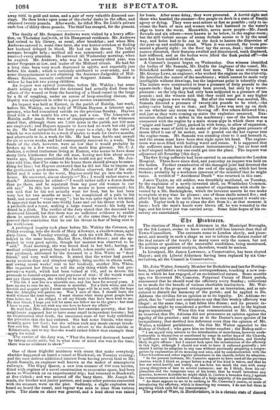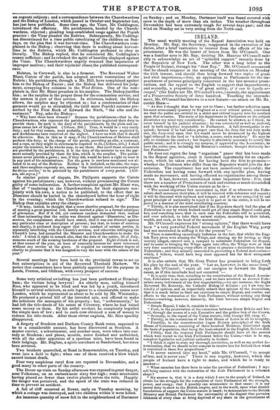Ebe Vrobintts.
The election of Mayors and Aldermen in the Municipal Boroughs, on the 9th instant, seems to have excited still less interest than that of Town-Councillors. The accounts come to London slowly, and piece- meal, and mostly in such a shape as not to inform the distant reader of the real nature of the result ; in many eases only the names, but not the politics or qualities of the successful candidates, being mentioned. To attempt any general analysis, therefore, would be useless.
In Liverpool, Mr. James Lawrence, a Conservative, has been elected Mayor ; and six Liberal Aldermen having been replaced by six Con- servatives, all the Council is Conservative.
Mr. John Walter, formerly Member for Berkshire and last for Notting- ham, has published a voluminous correspondence, touching a new con- test in which he has engaged, of an ecclesiastical nature. Some months ago, the Reverend Mr. Cameron, Perpetual Curate of Hurst parish, announced that he should read the offertory every Sunday ; collections to be made for the benefit of various charitable institutions. Mr. Wal- ter objected to the proposed arrangement as an innovation, and as cal- culated to disturb the harmony of the parish ; and he applied to Dr. Addams the civilian for an opinion as to its legality. Dr. Addams re- plied, that he "could not undertake to say that this weekly offertory was illegal : at the same time, it had fallen into disuse; and its present in- troduction might be considered a perfect innovation, and in the highest degree injudicious." When this was communicated to Mr. Cameron, he observed that Dr. Addams did not pronounce an opinion against the legality of the practice ; and that as to the Doctor's mere opinion of its inexpediency, that merited less deference even than the opinion of Mr. Walter, a resident parishioner. On this Mr. Walter appealed to the Bishop of Oxford ; who gave him no better comfort : the Bishop said- ., I am myself very adverse to the introduction of mere forms, however unob- jectionable in themselves or sanctioned by usage in earlier days of the Church, if indifferent and liable to misconstruction by the parishioners, and thereby likely to give offence : but I cannot look upon the introduction of the offertory in this light, although I should not wish to have it enforced generally ; nor should I advise its adoption in any case without previously preparing a congre- gation by explanation of its meaning and uses, and by communication with the Churchwardens and other regular attendants in the church, before its adoption. " In the present instance, Mr. Cameron appears to have used all the previous caution which I think so proper before a step of the kind is taken, and that he has not acted hastily and rashly, as has been too much the case with many young clergymen of late in several instances; nor do I think, from his ex- planation and the temperate tone of his letter, that he would introduce any practice, however desirable he might think it, (unless a bounden duty,) against the remonstrances and declared wishes of a large majority of his parishioners. "As there appears to me to be nothing in Mr. Cameron's course, or mode of introducing the offertory, which is deserving my censure, I do not feel there is anything which calls for my remonstrance." The parish a Ware, in Hertfordshire, is in a chronic gate of discord
on cognate subjects ; and a correspondence between the Churchwardens and the Bishop of London, which passed in October and September last, has just been published. Some time ago, the Vicar, Mr. Coddington, introduced the offertory. His parishioners, headed by the Church- wardens, objected ; pleading long-established usage against the Popish practice : the Vicar pleaded the Rubrics. Subsequently, Mr. Codding- ton discontinued for a time public catechizing of the children on Sun- days, on the plea that it was harvest-time. The Churchwardens com- plained to the Bishop ; observing that there is nothing about harvest- time in the Rubrics, which Mr. Coddington professed to obey so literally. The Bishop replied, that be considered Mr. Coddington's reason sufficient ; and he rebuked the spirit of hostility displayed against the Vicar. The Churchwardens angrily resented that imputation of improper motives ; and their rejoinder closes the published correspond- ence.
Helston, in Cornwall, is also in a ferment. The Reverend Walter Blunt, Curate of the parish, has adopted several restorations of the Rubric; his parishioners, through a Mr. Hill, have complained against him to the Bishop of Exeter ; and the Bishop has delivered his judg- ment, occupying five columns in the West Briton. One of the com- plaints is, that Mr. Blunt preaches in his surplice. The Bishop justifies him ; as the surplice is the proper dress for the communion-service, and the sermon is part of that service. In strictness, indeed, the Bishop allows, the surplice may be objected to ; but a condemnation of that garment would go to reestablish the (still more Popish) costume pre- scribed by the First Book of Edward the Sixth, " the albe and the vestment." Nay, asks the Bishop-
" Why have these been disused ? Because the parishioners—that is, the Churchwardena, who represent the parishioners—have neglected their duty to provide them ; for such is the duty of the parishioners, by the plain and ex- press canon law of England. (Gibson, 200.) True, it would be a very costly duty; and for that reason, most probably, Churchwardens have neglected it, and Archdeacons have connived at the neglect. I have no wish that it should be otherwise. But, be this as it may, if the Churchwardens of Helston shall perform this duty, at the charge of the parish, providing an albe, a vestment, and a cope, as they might in strictness be required to do, (Gibson, 2010 I shall enjoin the minister, be be who he may, to use them. But until those ornaments are provided by the parishioners, it is the duty of the minister to use the gar- ment actually provided by them for him, which is the surplice. The parish- ioners never provide a gown ; nor, if they did, would he have a right to wear it in any part of his ministrations. For the gown is nowhere mentioned nor al- luded to in any of the .Rubrics. Neither is it included, as the albe, the cope, and three surplices expressly are, among the furniture and ornaments proper for divine service.' to be provided by the parishioners of every parish. (Gib- son, uld supra.)"
In similar points of dispute, Dr. Phillpotts supports the Curate against his parishioners ; not, however,'without pronouncing the Curate guilty of some indiscretion. A further complaint against Mr. Blunt was, that of "tendering to the Churchwardens, for their signature con- jointly with his own, a notice to be published, to the effect that no Dissenter should be buried in the churchyard before the hour of eight in the evening ; which the Churchwardens refused to sign." The Bishop thus explains away the charge-
" It may, indeed, he thought that a mere abortive proposal, for the purpose of meeting a great practical evil, hardly merited a place in a formal catalogue of grievances. But if it did, yet common candour demanded that, instead of thus intimating that the notice was directed against Dissenters,' as Dis- senters, the complainant should have stated, that it was not directed against any particular class or description of persons ; but that, in terms of courtesy and charity, it professed deep regret that 'the conduct of certain parties, in repeatedly interfering with the Church's services, and otherwise infringing the Church's laws, had compelled the Minister and Churchwardens to make the rule.' I think it right to remark also, that the date of the notice, 3d of July, removes much of the seeming harshness of the proposal. Eight o'clock is not, at that season of the year, an hour of unseemly lateness fur mere interment without any service at the grave. It required no extraordinary degree of charity to presume that it was designed to vary the hour with the season of the year."
Several meetings have been held in the provincial towns to set on foot subscriptions in aid of the Reverend Theobald Mathew. We notice that committees have been publicly appointed for the purpose in Leeds, Preston, and Oldham, with every prospect of success.
Some very artistical swindling has just been performed at Birming- ham; the victims being lawyers I An elderly man, calling himself Rice, who appeared to be blind and was led by a youth, introduced himself to several solicitors, as sole legatee to a considerable estate near London, which he represented as about to be sold by Mr. Winstanley. He produced a printed bill of the intended sale, and offered to make the solicitors the managers of his property : but, " unfortunately," he had left the title-deeds of his estate at Coventry, where he had raised some money on them. By his artful conduct he completely beguiled the simple men of law ; and in each case obtained a sum of money to redeem his title-deeds. After these clever exploits, Mr. Rice speedily disappeared.
A forgery of Stockton and Durham Comity Bank notes, supposed to be to a considerable amount, has been discovered at Stockton. A master currier, a schoolmaster, and another man, were taken into cus- tody at Stockton ; and plates, moulds, notes finished and unfinished, with all the other apparatus of a spurious mint, have been found in their lodgings. Mr. Buglass, a spirit-merchant at Sunderland, has since been arrested.
Two brothers quarrelled, at Road in Somersetshire, on Tuesday, and went into a field to fight ; when one of them received a blow which caused instant death.
Four very suspicious rural fires are reported in Devonshire, and a good many in other parts of the country.
The Dover up-train on Sunday afternoon was exposed togreat danger, near Folkstone, on an embankment sixty feet high ; some miscreants having placed no fewer than twelve planks across the rails. Happily the danger was perceived, and the speed of the train was reduced in time to prevent an accident.
A fall of cliff occurred at Dover, early on Tuesday morning, by 'Which a cottage was destroyed, and two children within it were killed. An immense quantity of snow fell in the neighbourhood of Dartmoor
on Sunday ; and on Monday, Dartmoor itself was found covered with snow to the depth of more than six inches. The weather throughout Devonshire had been extremely rough for several days past ; and the wind on Monday set in very strong from the North-east.



























 Previous page
Previous page